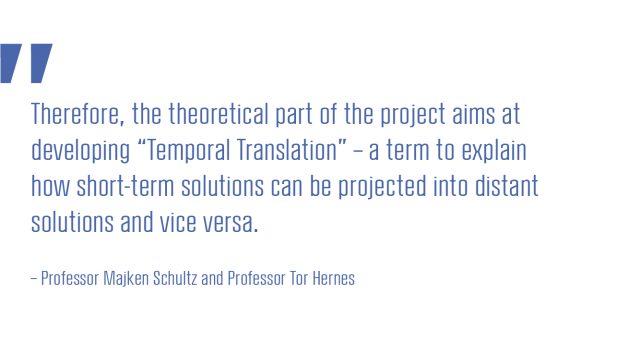Actionable Futures Project
Making Distant Futures Actionable: Innovating for a Zero Carbon Future is a collaboration between the Centre for Organization and Time and four international research partners.

Summary
The project will investigate how synergies are created between short term-solutions and distant futures that lie beyond the strategic horizons of most companies. An underlying idea of this project is that actors of different time orientations need each other for distant climate goals to be met. “In reality we only have a very small window of time to make this happen,” says Majken Schultz and Tor Hernes, both professors at the Centre for Organization and Time at the Department of Organization at CBS.
The current problem when addressing the climate goals is that innovative solutions are restricted by pressure for short-term performance and value-creation. Long-term climate goals, on the other hand, are abstract and often experienced as very distant. Previous research has often assumed that the two are separate and even irreconcilable which is what this project will try and find a solution to.
“With less than a decade left to prevent long-term damage to the planet we are going to need to accelerate the green transition and bring these two together. Research shows that each of them will most likely fail if they stand alone. This project will show the two need each other,” they add.
The project will investigate how synergies are created between short term-solutions and distant futures that lie beyond the strategic horizons of most companies. “Hence, the project title ‘Making the distant future actionable”, state Professor Majken Schultz and Professor Tor Hernes, who will manage the four-year project funded by Novo Nordisk Foundation.

Translating between short and long-term
Current research works from the assumption that all actors should aim at the long-term. The project will challenge this assumption and show how short-term thinking is vital for thinking for the long-term, just as long-term thinking is vital for the short-term. But the two-way influence is not symmetrical. Therefore, the theoretical part of the project aims at developing “Temporal Translation” – a term to explain how short-term solutions can be projected into distant solutions and vice versa.
“It is a bit like translating between languages, where we move back and forward with different words to frame similar meanings. Except that in our case we consider how translation takes place across time; how actors project on-going solutions into the distant climate goals and conversely, how emerging innovations may become part of something that is materialised 10-20 years from now,” they explain.
“Our current research in a related project funded by Velux Foundation, shows how novel solutions in sustainable packaging of dairy produce are created by Arla (also a partner of the NNF-funded project),” Tor Hernes states.
“Our colleague, postdoc researcher Miriam Feuls, analyses how actors from different functions collaborate to ensure that innovative solutions are viable for the distant future. We find in that study that actors move back and forth (translate) between short-term and distant solutions through different sets of collaborative practices, such as how future narratives frame their economic and environmental calculations, while these calculations enable them to modify future narratives in turn,” adds Majken Schultz.
Different actors, different sectors
An underlying idea of this project is that actors of different time orientations need each other for distant climate goals to be met.
The project will explore how different types of actors interact to “co-create” solutions that comprise both singular innovations and holistic solutions.
The project is organised into three sub-projects, each one headed by a postdoctoral researcher (these are being recruited now). Each sub-project will study focal companies in a sector important to the green transition, but organised very differently: Food (Arla), life-science (Novo Nordisk) and energy (in process). In collaboration with each company, will select specific innovation projects that involve collaboration between different types of actors, such as universities, entrepreneurs, public institutions, or other corporations.
“For each sector/sub-project, we will focus on what specific management challenges arise from translating between innovative solutions and climate goals. We do not expect to find one model, but rather a variety of models, which we intend to develop in ways that are helpful to managers,” says Majken Schultz and Tor Hernes.
The road ahead
The project plans to host open seminars relevant to the research themes and participate in international conferences, such as European Group for Organizational Studies and Academy of Management. The idea here is to expand the research agenda on organization, time and sustainability in collaboration with the international research community and represented by four international research partners.
The project is also confronted with some interesting challenges. “It is always a challenge is to apply qualitative social science theorizing in a natural science setting. In our case we will engage in longitudinal studies of specific innovation projects, often emerging from natural and technical sciences, and analyse them from a social science view. In addition, our qualitative research requires close collaboration with the involved companies etc. and the ability to discuss our findings in ways that are meaningful to actors from the natural sciences,” they add.
Also, it is a challenge whether the innovation projects will remain as ambitious and relevant to climate change as they are expected to be. “We will select the innovation projects to be studied based on their current importance and future potential to the involved actors. We have every reason to believe that management in our focal companies will stick to their priorities and future ambitions, but as we have all learned this last year the world is less predictable than we often assume,” concludes Majken Schultz and Tor Hernes.
About the project
Making Distant Futures Actionable: Innovating for a Zero Carbon Future is a collaboration between the Centre for Organization and Time and four international research partners: Professor Tima Bansal, Ivey Business School (Canada), Professor Raghu Garud, Penn State University (US) Professor Juliane Reinecke, Kings College (UK) and Professor Daniel Nyberg, University of Newcastle (Australia).
To follow the project, sign up by emailing sis.ioa@cbs.dk to receive invitations and news updates.